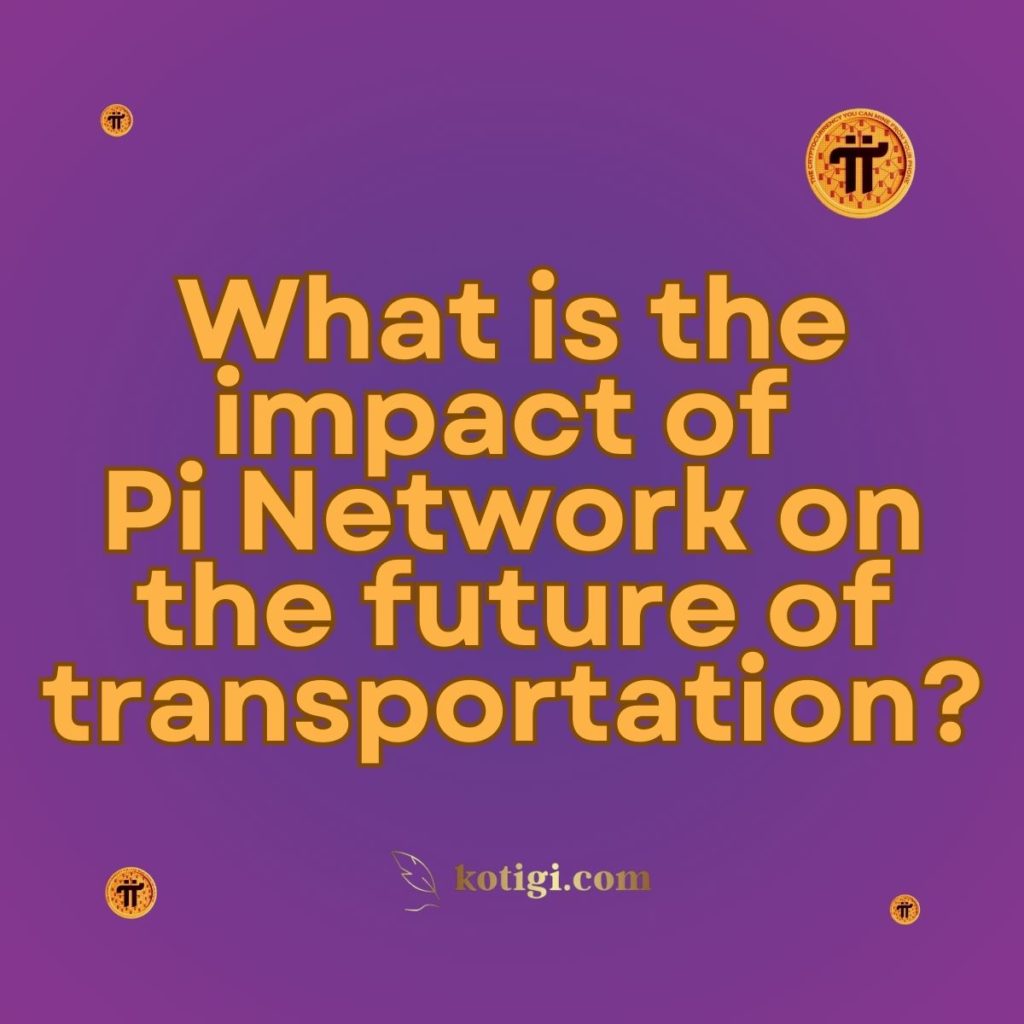
What is the impact of Pi Network on the future of transportation?
Pi Network is set to revolutionize the transportation industry by introducing decentralized payment systems, enhancing peer-to-peer ride-sharing, reducing fraud, promoting sustainability, and enabling global accessibility. In this article, we explore how Pi Network will impact the future of transportation.
Introduction
The transportation industry is evolving rapidly, with technological advancements driving significant shifts in how we move people and goods. Blockchain technology, with its promise of decentralization, transparency, and security, is emerging as a major player in transforming transportation. Pi Network, a mobile-first cryptocurrency, has the potential to introduce game-changing innovations in this sector. From decentralized payment solutions to peer-to-peer ride-sharing and the promotion of sustainable practices, Pi Network can reshape how transportation services are accessed, paid for, and operated. In this article, we’ll explore the profound impact Pi Network could have on the future of transportation.
Decentralized Payments for Transportation Services
Pi Network provides a decentralized payment system that can streamline the way transportation services are paid for, reducing costs and increasing accessibility.
Seamless Payments Across Borders
In a globalized world, international travelers often face challenges when it comes to paying for transportation services across different countries. Pi Network offers a universal cryptocurrency that can be used across borders without the need for currency conversions. Whether paying for a ride-share service, a bus ticket, or a train pass, travelers can use Pi coins to make seamless, low-cost transactions.
Eliminating Middlemen in Payment Processing
Traditional payment methods in the transportation sector often involve intermediaries like banks or credit card processors, which increase transaction fees. With Pi Network, payments are direct and decentralized, allowing service providers and consumers to transact without the need for costly middlemen. This can reduce operational costs for transportation companies while also making transportation more affordable for users.
Secure and Transparent Payments
The blockchain technology behind Pi Network ensures that all transactions are secure and transparent. This reduces the risk of fraud and payment disputes, fostering greater trust between transportation service providers and their customers. Every transaction is recorded immutably on the blockchain, creating a verifiable and auditable payment history for both parties.
Peer-to-Peer Ride-Sharing and Car Rentals
Pi Network’s decentralized structure has the potential to enhance the growing peer-to-peer (P2P) ride-sharing and car rental markets.
Decentralized Ride-Sharing Platforms
Ride-sharing platforms have grown in popularity, but they are typically managed by centralized corporations that take a significant percentage of each transaction. Pi Network enables the creation of decentralized ride-sharing platforms, where drivers and passengers can interact directly and make payments using Pi coins. This reduces costs for drivers while offering lower fares for passengers, all while enhancing transparency.
P2P Car Rentals Using Pi
Peer-to-peer car rentals are another area where Pi Network can make an impact. Owners of vehicles can rent them out directly to individuals through decentralized platforms, bypassing traditional rental companies. Payments can be made in Pi coins, and blockchain’s transparency ensures that rental agreements, payments, and vehicle histories are securely recorded and verifiable.
Expanding Access to Rides and Rentals
By decentralizing ride-sharing and car rental services, Pi Network allows for broader participation, especially in regions where access to centralized services may be limited. Local drivers and vehicle owners can connect with international travelers and local customers alike, enhancing transportation options in underserved markets.
Reducing Fraud and Enhancing Trust in Transportation
Pi Network can significantly reduce fraud and enhance trust within the transportation sector through its transparent and immutable blockchain technology.
Verifiable Ride and Service Records
A major issue in the ride-sharing and car rental industries is the lack of transparency around service records. Blockchain’s immutable ledger can record ride histories, vehicle maintenance logs, and driver or owner reputations. Pi Network’s decentralized approach ensures that all service records are tamper-proof, building trust between riders and service providers.
Preventing Fraudulent Bookings
Booking fraud, especially in peer-to-peer platforms, is a concern for many users. With Pi Network, transportation bookings are securely stored on the blockchain, making it impossible for fraudulent bookings or fake ride listings to go unnoticed. This transparency provides peace of mind for users, whether they’re booking a ride or renting a vehicle.
Secure Payments and Dispute Resolution
Pi Network’s decentralized payment system minimizes the risk of fraudulent payments, reducing chargeback disputes and unauthorized transactions. Additionally, blockchain’s transparent nature allows disputes to be resolved more effectively, as all transaction data is easily accessible and verifiable by both parties.
Promoting Sustainable Transportation
Sustainability is a growing concern in the transportation industry, and Pi Network has the potential to promote eco-friendly transportation solutions.
Incentivizing Green Transportation
Pi Network can be used to create tokenized rewards systems that incentivize the use of sustainable transportation options. For example, ride-sharing platforms or public transportation providers could reward passengers who choose electric or hybrid vehicles with Pi coins. These incentives encourage environmentally friendly transportation choices and help reduce the carbon footprint of travel.
Supporting Sustainable Mobility Startups
Blockchain technology and cryptocurrencies like Pi can support the development of sustainable mobility startups by providing them with decentralized funding options. Startups focused on electric vehicles, bike-sharing, or sustainable public transport systems could use Pi coins to raise funds, build ecosystems, and engage with environmentally conscious users.
Decentralized Carbon Offsetting Programs
With Pi Network, transportation companies can participate in decentralized carbon offsetting programs. By integrating Pi coins into these programs, transportation providers can offset their carbon emissions by investing in sustainability projects, rewarding customers who choose green travel options, and promoting a culture of environmental responsibility.
Expanding Accessibility to Underserved Markets
Pi Network can make transportation services more accessible to underserved populations, both in developed and developing countries.
Reducing Financial Barriers
In many parts of the world, access to traditional financial systems is limited. Pi Network provides a decentralized alternative that doesn’t require a bank account or credit card. This allows individuals in underserved markets to access transportation services using Pi coins, expanding mobility options in regions with underdeveloped financial infrastructure.
Connecting Local Transportation Providers to a Global Network
Local transportation providers in rural or remote areas can leverage Pi Network to connect with a global customer base. Travelers and locals alike can use Pi coins to pay for services offered by small-scale providers, helping to integrate these communities into the broader transportation ecosystem without the need for costly third-party systems.
Empowering Grassroots Transportation Solutions
Pi Network’s decentralized model enables grassroots transportation solutions to thrive. Local communities can develop their own ride-sharing, carpooling, or public transport systems, with Pi coins facilitating payments and promoting self-sufficient transportation networks. This empowers communities to solve their own mobility challenges in a sustainable and locally relevant manner.
Conclusion
The impact of Pi Network on the future of transportation is far-reaching. By introducing decentralized payment systems, enhancing peer-to-peer ride-sharing and rentals, promoting transparency and trust, fostering sustainability, and expanding accessibility, Pi Network is poised to transform the transportation sector. Its ability to reduce costs, increase security, and support innovative, grassroots transportation solutions will play a crucial role in shaping the future of mobility. As Pi Network continues to grow, its integration into transportation systems will bring about more efficient, secure, and environmentally friendly ways to move people and goods around the world.
Key Takeaways
- Decentralized Payments: Pi Network offers a decentralized payment system that simplifies cross-border transactions, reduces costs, and enhances payment security for transportation services.
- Peer-to-Peer Mobility Solutions: Pi Network facilitates the creation of decentralized ride-sharing and car rental platforms, empowering users and service providers to connect directly, lowering costs, and expanding access to transportation services globally.
- Enhanced Transparency and Trust: By leveraging blockchain technology, Pi Network ensures transparent and immutable records of transportation transactions, reducing fraud and fostering greater trust between service providers and users.
- Sustainable Transportation Incentives: Pi Network can promote eco-friendly transportation choices by rewarding users with Pi coins for choosing green travel options, supporting sustainable mobility practices.
- Global Accessibility: Pi Network breaks down financial barriers, providing access to transportation services in underserved regions and empowering local communities to create their own decentralized mobility solutions.




